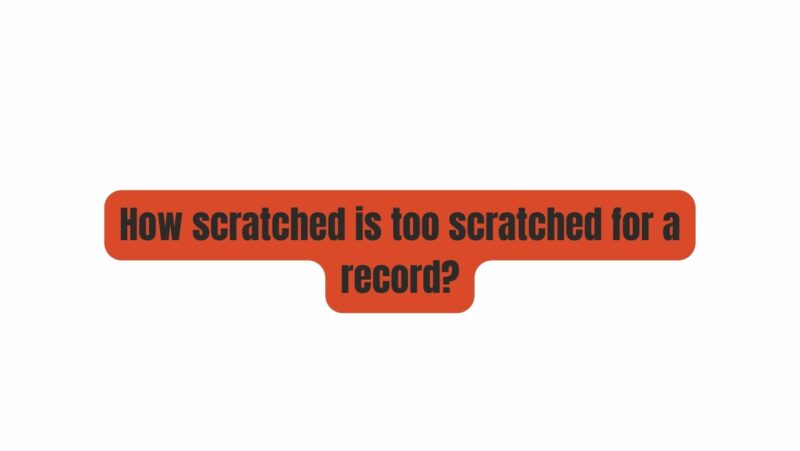Vinyl records are a delicate medium, and they can be damaged by scratches. The stylus on a record player is a very fine needle that touches the record surface. If the stylus scratches the record, it can damage the grooves and make the record unplayable.
The severity of the damage caused by a scratch depends on the depth and length of the scratch. A shallow scratch may not cause any audible problems, but a deep scratch can make the record unplayable.
Here are some of the things that can cause scratches on vinyl records:
- Dirt and dust: Dirt and dust can get caught in the grooves of the record and cause scratches.
- Handling: Handling vinyl records with dirty or rough hands can also cause scratches.
- Improper storage: Storing vinyl records in a way that exposes them to dust, dirt, or other debris can also cause scratches.
- Accidents: Accidents such as dropping a record can also cause scratches.
If you notice that your vinyl records are scratched, there are a few things you can do to try to repair them:
- Clean the records with a soft, clean cloth. This will help to remove any dirt or dust that may be causing the scratches.
- Use a record cleaner. There are a number of record cleaners available that can help to remove scratches.
- Get the records professionally repaired. If the scratches are severe, you may need to get the records professionally repaired.
By taking care of your vinyl records and avoiding scratching them, you can help to ensure that they last for many years to come.
Here are some additional tips for preventing scratches on vinyl records:
- Handle records with clean, dry hands.
- Store records in a clean, dry place.
- Use a record sleeve to protect the record surface.
- Avoid playing records with a dirty or damaged stylus.
- Be careful when handling records. Avoid dropping or dragging them across a surface.
By following these tips, you can help to keep your vinyl records in good condition and prevent them from being scratched.
In short, how scratched is too scratched for a record depends on the severity of the scratches. Shallow scratches may not cause any audible problems, but deep scratches can make the record unplayable. If you are unsure whether or not a record is playable, it is best to err on the side of caution and not play it.
Here are some general guidelines for determining how scratched is too scratched for a record:
- Shallow scratches: Shallow scratches may not cause any audible problems. You can try cleaning the record with a soft, clean cloth or using a record cleaner. If the scratches are still visible, you may be able to get them repaired professionally.
- Deep scratches: Deep scratches can cause audible problems, such as skipping or crackling. You should not play a record with deep scratches. If the scratches are severe, you may need to get the record professionally repaired or replaced.
- Multiple scratches: Multiple scratches can also cause audible problems. Even if the scratches are not deep, they can add up and make the record unplayable. If you have a record with multiple scratches, it is best to not play it.
By following these guidelines, you can help to protect your vinyl records from scratches and keep them in good condition for many years to come.


